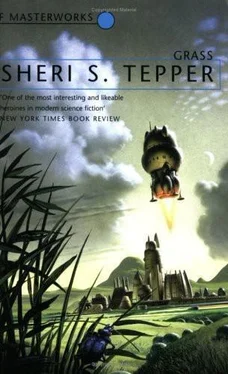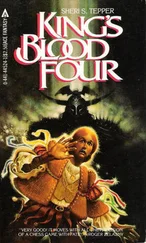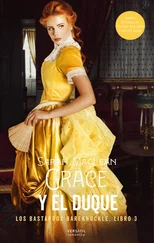There were inhabitants calling from windows, talking from rooms above and below, conversing as they moved along the roadways, their voices growing louder as they came near, dwindling away as they passed Shadowy forms met along the railings. A group leapt from a doorway into the play of light from the applauding leaves. They were graceful, only slightly reptilian. Their eyes lit with laughter, their hands extended to one another as though to say, “Welcome.”
But there was no one there. No one at all.
A pair of lovers leaned on the railing of the bridge, arms entwined. Rillibee walked through them, his face spattered with their faces, his body with their bodies, and they reassembled behind him, still staring into one another’s glowing eyes.
“Ghosts,” breathed Tony. “Mother…”
“No,” she said, tears on her cheeks at the sight of the lovers. “Holos, Tony. They left them here. The projectors must be somewhere in the trees.”
“They gave them to one another,” Mainoa said. “Toward the end. When there were fewer and fewer of them. To keep the last survivors company.”
“How do you know?”
“I was told,” he said, “just now. And it fits in with other things I have learned since we had lunch together that day at Opal Hill.”
“The language…” Marjorie turned to him, eyes wide.
“The language, yes.”
“I was so eager to get away, to find Stella, I never thought to ask—”
“The great machines at Semling have chewed on the problem, chewed and swallowed and spat it out again. The machines can translate the books of the Arbai. Some. Oh, half, let us say. Half they can read. The other half they can guess at. The clue was there in the vines on the doors. Where we had never thought to look.”
“And the carved doors themselves?”
“They can read those as well.”
“What do they say?”
Brother Mainoa shook his head, trying to laugh, the laugh becoming a cough which bent him double. ‘They say the Arbai died as they lived, true to their philosophy.”
“Here?”
“There on the plain they died quickly. Here in the trees they died slowly. Their philosophy prevented their killing any intelligent thing. In their city on the plain, the Hippae had slaughtered their kinfolk. Those who lived in this summer city among the trees could not go back to live there safely. They did not wish to die. So they lived out one last summer here, and when winter came they slowly died here, knowing that in all the universe they were the last of their people.”
“How long ago?”
“Centuries. Grassian centuries.”
She looked around her at the woven buildings and shook her head.
“Not possible. These structures would not last. The trees would grow; eventually they would die and fall. These woven roadways would rot away.”
“Not if they were renewed, hour by hour, day by day. Not if they were mended.”
“By whom?”
“Yes, Marjorie, by whom? We all wonder, don’t we. Yes. I think we will meet them very soon.”
Rillibee led them along the woven streets. Before them the way widened, expanding into a broad platform with rococo railings and spiraled pillars supporting a wide witch’s hat of a roof.
The town square, Marjorie thought. The village green. The meeting hall, open to the air, to the wind and the sound of birds. All around it shadowy figures walked and danced and saluted one another, shadows so thickly cast that for a moment the humans thought the mighty figure padding toward them from across the platform was another shadow. When they saw that it was not, they drew together, Tony reaching for the knife he carried.
“No,” said Brother Mainoa, putting his hand on the boy’s arm. “No.” He walked forward to see what he had so often longed to see with his eyes instead of his mind. “No. He won’t hurt us.”
They saw an expanse of trembling skin over eyes they could not quite see. Fangs, or something like fangs, in a gleam of blued ivory. Flaring wings of hair, doubly flaring violet auroras, like spurts of cold lightning.
Brother Mainoa murmured, head down, as though he addressed a hierarch, “We are honored.”
The being crouched. It gave the impression of nodding. Paws curled — no — hands curled upon the braided walkway. Hands which seemed for an instant to have three fingers and opposed, furry thumbs. Behind maned shoulders lay an armored expanse of mottled hide and callused plates, seen only for an instant, or perhaps not seen at all. It was an impression only, gone too quickly to define. They could not describe it except to say it was not like anything else, not like any earth creature, not like any Grassian creature except itself. The proportions were wrong. The legs were not the usual thing one thought of as legs.
Brother Mainoa confronted this mirage with an expression of awed interest, blinking rapidly, as they all were, trying to clear their vision. “Perceiving you for the first time has made me wonder what evolutionary tangle led to the development of this ferocious aspect,” he murmured, eyes down.
Great orbs may have widened. Perhaps a long, curved talon extruded from a half-furred, half-scaled finger and pointed toward Brother Mainoa’s throat.
Brother smiled as though at a joke. “I cannot believe you mean that. You don’t need any of it against me. You don’t need much of it against mankind unless they choose to use heavy weaponry against you, and if they did, all your armor wouldn’t help much. Men are expert killers, if nothing else.”
Eyes narrowed, possibly, and Brother Mainoa seized his head in both hands. The others fell to their knees, holding their heads, except for Sylvan, who started forward, anger and fear combining to make him reckless.
“Whoa. Whoa.” Mainoa drew himself erect, gasping. “I wish they wouldn’t do that.” Now he knew what evolutionary tangle had led to this armour. There had been an enemy once, a huge, inexorable creature. Brother Mainoa had received an excellent picture of it rampaging about, devouring both Hippae and hounds. His head ached from the assault.
“Extinct?” he asked, receiving a feeling of agreement. “Did you kill them?”
They received an impression of perplexity, then sureness. No. The Arbai had killed them. The armored monsters had not been intelligent things. They had been only walking appetites. The Arbai had done away with them to protect the Hippae. Since that time, there had been many, many Hippae.
Brother Mainoa sat down on the walkway, suddenly lost in weariness. “This being is my friend,” he said to the other humans. “He and I have been talking for some time.” Now that he had almost seen the creature, he felt weak with anxiety over all the times he had talked with it, unseen. If he had seen, would he have said — ? No. If he had seen, he could not have said anything. One could talk to gods and angels only so long as they did not look like gods and angels, he thought. In order to approach them, we must think of them as like ourselves, and one could not think of the foxen as like oneself…
“Foxen,” Tony breathed. He was still on his knees with the others.
“Foxen,” Mainoa agreed. “He or they managed to keep the Hippae at bay long enough for us to get here. He and a few of his friends wanted us to come here, where they could get a good look at us.”
“Does he know where Stella…” Marjorie pleaded. She had the impression of a vast head turned in her direction. She shuddered as she said, “I see. Of course. Yes.” Sylvan said, “Marjorie?”
“I can hear him,” she cried. “Sylvan, I can hear him. Can’t you?” He shook his head, casting a suspicious glance at the place he thought the foxen was. “No. I hear nothing.”
“You have been a hunter too long,” Mainoa said. “You have been deafened by the Hippae.”
Читать дальше












